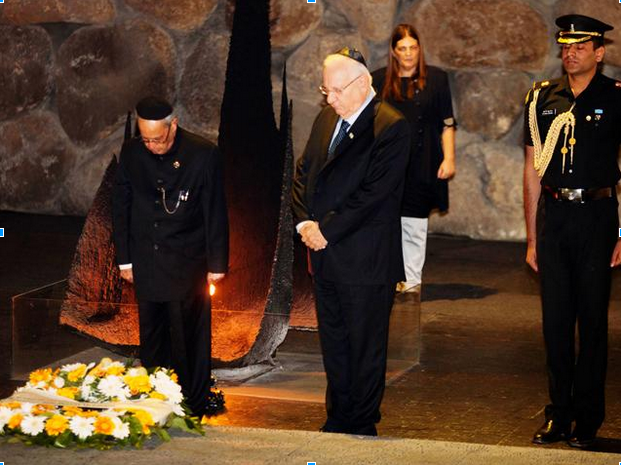President Mukherjee Steps Straight Into Palestine-Israel Fire
President Pranab Mukherjee escorted by Israeli President Reuven Rivlin at the Hall of Remembrance

NEW DELHI: President Pranab Mukherjee has stepped straight into the Palestinian-Israel conflict with a visit that has both sides in the bitter war taking potshots at him and through the Indian President at each other. It is not clear how the Ministry of External Affairs cleared this trip at a time when Jerusalem has become the new battleground with Palestinians under severe attack on a daily basis.
The ‘balancing act’ that New Delhi claims as policy for the Palestinian-Israel conflict, and was intended to be reflected in the Presidential visit to both sides of the fence as it were, has clearly not been appreciated on the ground as it fed into the hostility and anger. Israel stepped in to stop 30 computers and other equipment that the Indian President was carrying for the Palestinians for the Information Technology centre he was scheduled to inaugurate at the Al Quds university. Last heard, Indian diplomats were in hectic consultations with the Israeli authorities for the release of the consignment that was stopped at the Haifa Shipping Port. This clearly did not make it in time for the President’s visit. Ohad Horsandi, spokesperson of the Israeli embassy in India was quoted by the media as confirming, "the consignment is with the Israeli customs and the procedure is taking time. Israel has no interest in stopping this. We are trying our best to expedite the process.''
Despite the long speech he gave listing milestones in India-Palestine relations, President Mukherjee was unable to still the anger that has often been voiced by Palestinians about what they see as the ‘Indian betrayal.’ His visit to Al Quds university had to be cut short as hundreds of Palestinian students converged to protest his visit to Israel, carrying placards, “India why are you cooperating with the occupiers.” And in Arabic, “Indian President, don’t remain silent against the butchers who are slaying Palestinians.” And yet again, “Mr President, we want you to hear our voices and concerns.” He was unable to inaugurate the Jawaharlal Nehru Secondary School for Boys, and left the University shortly after the honorary degree was conferred on him.
The protest that continued turned against Israel, and should have indicated even to the Indian government that the situation has worsened dramatically since the Israel attack on Gaza. Daily Palestinians are being rounded up, arrested, wounded and killed with Al Quds university being targeted by Israel. President Mukherjee who sought to list the past, was reminded loudly by the besieged Palestinians of the present, but clearly the present was not in his brief. The students were particularly agitated because of the killing of their colleagues by Israeli forces recently. President Mukherjee did not refer to this at all.
“India has always been at the forefront in promoting the Palestinian cause – India voted against the partition of Palestine at the United Nations General Assembly in 1947,” the President said in what were almost surreal interventions that did not reflect the current situation in the region. “We recognized the PLO (Palestine Liberation Organisation) as the sole and legitimate representative of the Palestinian people in 1974. India as also the first non-Arab country to recognize the State of Palestine in 1988,” he added. He spoke as if from the past about cooperation in education, of 12,000 Palestinian students having graduated from Indian universities and serving as a “bridge between our two countries.” The bridge does not seem to be working now, with the Palestinians openly upset about India’s growing proximity with Israel and her failure to speak out for them during the relentless attack on Gaza in which hundreds of Palestinians were killed.
Significantly, President Mukherjee’s speeches even though driven by the past and skirting the main issue of violence, did not go down well in Israel judging from the media coverage. Local Israeli newspapers commented adversely on his visit to Palestine pointing out that he had spoken extensively of friendship with the Palestinians and not said a word about “their terrorism.” Note was also taken in the Israeli media of the President’s use of a quote by Gandhi saying, “Palestine belongs to the Arabs in the same sense that England belongs to the English and France to the French.”
There has been considerable speculation as to why the proposed visit by Prime Minister Narendra Modi to Israel was cancelled (or postponed) and replaced by this visit of the Indian President. It is also not clear why and how the Ministry of External Affairs was unable to assess the local responses and calibrate the visit accordingly. The speeches by President Mukherjee in Jerusalem were stuck in the past and had not factored in the present situation in the region at all. As a result he erred on both sides, and while it is too early to say until the visit is over, did not realise the purpose or the potential of a presidential visit.
It might be recalled that in July this year, India abstained in a vote on a UN Human Rights Council resolution that backed a report critical of Israel’s behavior during last summer’s war in Gaza. The Palestinians were shocked, with the Palestinian Authority’s ambassador to India, Adnan Abu Alhaija maintaining at the time, “The Palestinian people and leaders were very happy with the UN resolution, but the voting of India has broken our happiness.” Israel, of course, celebrated this as a major diplomatic achievement.



